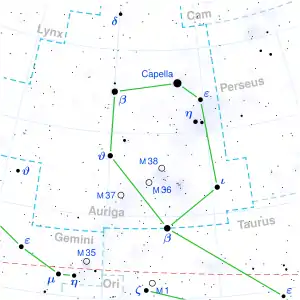Psi9 Aurigae
Psi9 Aurigae, Latinised from ψ9 Aurigae, is a star in the northern constellation of Auriga. It is dimly visible to the naked eye with an apparent visual magnitude of 5.75.[2] Based upon an annual parallax shift of 2.59 mas,[1] the distance to this star is approximately 1,300 light-years (400 parsecs).
 | |
| Observation data Epoch J2000 Equinox J2000 | |
|---|---|
| Constellation | Auriga |
| Right ascension | 06h 56m 32.05791s[1] |
| Declination | +46° 16′ 26.3867″[1] |
| Apparent magnitude (V) | 5.75[2] |
| Characteristics | |
| Spectral type | B8 IIIe[3] |
| U−B color index | –0.46[4] |
| B−V color index | –0.06[4] |
| Astrometry | |
| Radial velocity (Rv) | –41.1[5] km/s |
| Proper motion (μ) | RA: –2.93[1] mas/yr Dec.: +4.07[1] mas/yr |
| Parallax (π) | 2.59 ± 0.38 mas[1] |
| Distance | approx. 1,300 ly (approx. 390 pc) |
| Absolute magnitude (MV) | −2.03[6] |
| Details | |
| Radius | 3.7[2] R☉ |
| Luminosity | 868[6] L☉ |
| Rotational velocity (v sin i) | 235[7] km/s |
| Other designations | |
| Database references | |
| SIMBAD | data |
The spectrum of Psi9 Aurigae matches a giant star with a stellar classification of B8 IIIe.[3] The 'e' suffix indicates this is a Be star that shows emission lines of hydrogen in its spectrum. This is caused by a circumstellar shell of hot gas. The emission undergoes variability on a time scale of sixteen years.[3]
See also
References
- van Leeuwen, Floor (November 2007), "Validation of the new Hipparcos reduction", Astronomy and Astrophysics, 474 (2): 653–664, arXiv:0708.1752v1, Bibcode:2007A&A...474..653V, doi:10.1051/0004-6361:20078357, S2CID 18759600. Note: see VizieR catalogue I/311.
- Pasinetti Fracassini, L. E.; et al. (February 2001), "Catalogue of Apparent Diameters and Absolute Radii of Stars (CADARS) - Third edition - Comments and statistics", Astronomy and Astrophysics, 367 (2): 521–524, arXiv:astro-ph/0012289, Bibcode:2001A&A...367..521P, doi:10.1051/0004-6361:20000451, S2CID 425754.
- Ghosh, K. K. (September 1989), "Search for rapid spectral variability in Psi(9) Aurigae", Publications of the Astronomical Society of the Pacific, 101: 839–843, Bibcode:1989PASP..101..839G, doi:10.1086/132504.
- Crawford, D. L. (February 1963), "U, b, v, and Hβ Photometry for the Bright B8- and B9-TYPE Stars", Astrophysical Journal, 137: 530, Bibcode:1963ApJ...137..530C, doi:10.1086/147526.
- Wilson, Ralph Elmer (1953), "General Catalogue of Stellar Radial Velocities", Carnegie Institute Washington D.C. Publication, Washington: Carnegie Institution of Washington, Bibcode:1953GCRV..C......0W.
- Anderson, E.; Francis, Ch. (2012), "XHIP: An extended hipparcos compilation", Astronomy Letters, 38 (5): 331, arXiv:1108.4971, Bibcode:2012AstL...38..331A, doi:10.1134/S1063773712050015, S2CID 119257644.
- Abt, Helmut A.; Levato, Hugo; Grosso, Monica (July 2002), "Rotational Velocities of B Stars", The Astrophysical Journal, 573 (1): 359–365, Bibcode:2002ApJ...573..359A, doi:10.1086/340590.
- "* psi09 Aur". SIMBAD. Centre de données astronomiques de Strasbourg. Retrieved 2012-08-23.
External links
This article is issued from Wikipedia. The text is licensed under Creative Commons - Attribution - Sharealike. Additional terms may apply for the media files.